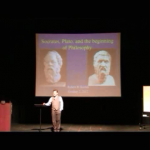My Dear Friend Jim,
Thank you so much for steering me towards the “Was Wittgenstein Right?” blog on the New York Times Website. It was intended to be provocative, and–predictably enough–I’m provoked. The author, Paul Horwich, reiterates Wittgenstein’s attack upon traditional (that is to say, academic) philosophy’s claim to produce a unique kind of knowledge–a type of meta-knowledge underlying the other sciences and disciplines, and its claim to solve a unique–and vital–kind of problem. Because of this strong attack upon the academy, Horwich suggests, Wittgenstein is pariah in most Philosophy Departments today, yet his criticisms should be listened to.
(that is to say, academic) philosophy’s claim to produce a unique kind of knowledge–a type of meta-knowledge underlying the other sciences and disciplines, and its claim to solve a unique–and vital–kind of problem. Because of this strong attack upon the academy, Horwich suggests, Wittgenstein is pariah in most Philosophy Departments today, yet his criticisms should be listened to.
Dr. Horwich seems to be employed, so the anti-Wittgenstein jihad does not appear to be very effective. My own work is heavily influenced by Wittgenstein, so my sympathies lie with him, but then again, I am not a professional academic (and, I have to admit, few of the brilliant women and men I went to graduate school with are, but that is hardly due to bias, but more do to various other academic and economic factors). I would, however, like to say a few words in defense of my calling, especially since I dismissed it so glibly in my last letter to Giedra. Let me try to answer the question “do we need philosophy?” in several different ways, since it can–as most questions can–be several different questions.
Do we need philosophy?
 Obviously, there are things we need more. Carpentry, food, medicine and many, many other things come to mind. However, I would say that we also do need philosophy. Literally, philosophy means the love of wisdom; who could question our need for that?
Obviously, there are things we need more. Carpentry, food, medicine and many, many other things come to mind. However, I would say that we also do need philosophy. Literally, philosophy means the love of wisdom; who could question our need for that?
Beyond just knowing “stuff,” most of us suspect there might be a type of knowledge we call wisdom, an ability to understand the choices we are faced with and to make the best choices, an ability to look behind the noise of public or popular opinion or behind the common sense of received traditions, and to try to penetrate to something beyond it. In an age of rhetoric and promotion, in an age of facts and information, we suspect there is something more, and that this something more is truth.
Granted, the large claims of a good deal of philosophy to penetrate this truth and lay it out scientifically have yet to be successful–as Wittgenstein points out. Yet, in a humble way, a more humbel quest might be possible. We would love to be wise enough to understand what that truth might be–or even just to catch enough of a fleeting glimpse of it to try to set our courses by it. Sophia, that holy wisdom that the ancients built temple for, and whom the Hebrew Scripture describes as calling in the streets and at the city walls, she still calls us–not to our deaths like the Sirens, but to a better life.
Philosophy, in its broadest sense, is the systematic search for that wisdom. Yes, we can catch a glimpse of wisdom in Poetry or Religion, but philosophy aims for a clearer, rational, accessible path towards the answers that draw us all near. Has my discipline achieved this? Well…
Do we need Philosophies, then?
 All those little systems or theories like Platonism or Hegelian Idealism or Existentialism?
All those little systems or theories like Platonism or Hegelian Idealism or Existentialism?
A long time ago, I spent a few years working in Human Resources Management, trying to help people to understand their benefits packages–retirement, insurance, flexible reimbursement accounts, etc. For the most part, I had people yell at me over the phone for 8 hours a day, and I tried to fix the messes that had been made. For a while, I had a temp helping me. She had a horse farm and a divorce, and–between one and the other–she needed an extra income.
Cindy once told me she didn’t know much about  philosophy, but her grandfather had left her a beautiful set of leather-bound classics, and when she was feeling down, and the world seemed hopeless, she would pour herself a glass of scotch, get the Roman Philosophers off the shelf, and read until the world seemed right again.
philosophy, but her grandfather had left her a beautiful set of leather-bound classics, and when she was feeling down, and the world seemed hopeless, she would pour herself a glass of scotch, get the Roman Philosophers off the shelf, and read until the world seemed right again.
I could give you many, many criticisms of the Roman Philosophers she was reading–probably Epictetus or Seneca and Marcus Aurelius. However, what they, the Stoics, write about is the idea that the world as we encounter it each day is senseless and brutal and hard, but that the universe as a whole is governed by reason and ultimately–on a macro-scale–makes sense.
Were the Stoics right? I don’t know; I can certainly give you a thoroughgoing critique of the Stoics failures. Did, however, the Stoics bring Cindy a little bit closer to wisdom? Yes, I think they did. Stoicism developed fully and consistently might not have had all the answers, and might not have been a good option for Cindy to fully embrace, but Cindy’s opportunity to read that slave, that senator, that emperor trying to develop the ideas of carrying on with dignity in a world that seemed to not make sense brought something to her life that helped her on her own quest for wisdom, and which stirred within her that love for wisdom.
I don’t think that the Stoics did this in spite of the fact that they embraced an overly ambitious, grandly worked out, and ultimately unsuccessful project, but precisely because they did. Their philosophy–those writings, and that piece of the ongoing philosophical conversation they were engaged in–was what ultimately moved Cindy, and which allowed her to think through their writings.
Do we need philosophers?
 Well, yes. I’m not sure how many, or how much they are worth, but we do need people who will pursue these paths clearly and consistently, even if the philosophies they arrive at might not be ones which we can accept. We also need people who will talks us through these philosophies, and who will try to get us to think “philosophically” ourselves. It is probably good that we are not all philosophers, but it might still be good if some of us are so that we all might try to pursue wisdom just a little more.
Well, yes. I’m not sure how many, or how much they are worth, but we do need people who will pursue these paths clearly and consistently, even if the philosophies they arrive at might not be ones which we can accept. We also need people who will talks us through these philosophies, and who will try to get us to think “philosophically” ourselves. It is probably good that we are not all philosophers, but it might still be good if some of us are so that we all might try to pursue wisdom just a little more.
Do we need philosophy?
Yes, we do need philosophy. No, philosophy isn’t really getting anywhere. Neither are most runners; they spend hours out on the road in all sorts of weather, but always end up where they started. However, they find that running helps them do many other things better and leaves them better off in general. Learning philosophy, reading philosophy, thinking philosophically, all these might make us just a little better at pursuing wisdom, and wisdom remains a worthwhile goal.
Certainly, philosophy has its limits. Thinking does not, in itself, make a bad world better. Philosophy is bad at healing heartache, and one cannot rationalize oneself out of a depression. For that, one needs other things–the kindness of friends, the glory of the  mountains, a lot of love, God, if you have him, some silliness, some dancing, and maybe medication, and certainly simple beauty like music, poetry, and cheese.
mountains, a lot of love, God, if you have him, some silliness, some dancing, and maybe medication, and certainly simple beauty like music, poetry, and cheese.
But I shall write about poetry and cheese another time.

This is really way over my head. The closest I get to philosophy is when I put the books on the shelves at BN in the morning. What very little I know of the Roman philosophers reminds me of Grumpy cat so it has to be good. I’m all about anything that reminds me of Grumpy cat, and now medication…..and cheese.
Hi Robert,
I hope you won’t mind the suggestion that you consider collecting your Philosophy Bistro pieces as a book someday. It’s beginning to remind me a little of Gretchen Rubin’s The Happiness Project, which ran regularly in Slate before appearing in a cover on a shelf. Not that your themes are precisely hers, but they lend themselves as nicely to regular perusal. And the combination of wit, philosophy, and cornbread appeals to me even more in practice than I thought it would in principle.
Brandon